SOCIAL DISTANCING: SIX FEET APART IS BETTER THAN SIX FEET UNDER!

THESE post are from Mother Jones. The first is a review of America since the coronavirus Covid 19 pandemic hit us and the opportunity to express your opinions, fears and activities to Mother Jones. The second is a collection of messages sent to Mother Jones of the positive actions people across the country and around the world are doing in response to this pandemic. My favorite is this one " I woke up early yesterday morning to find that my wife, who is terminally ill, was not by my side. I found her in her sewing room, sewing masks.
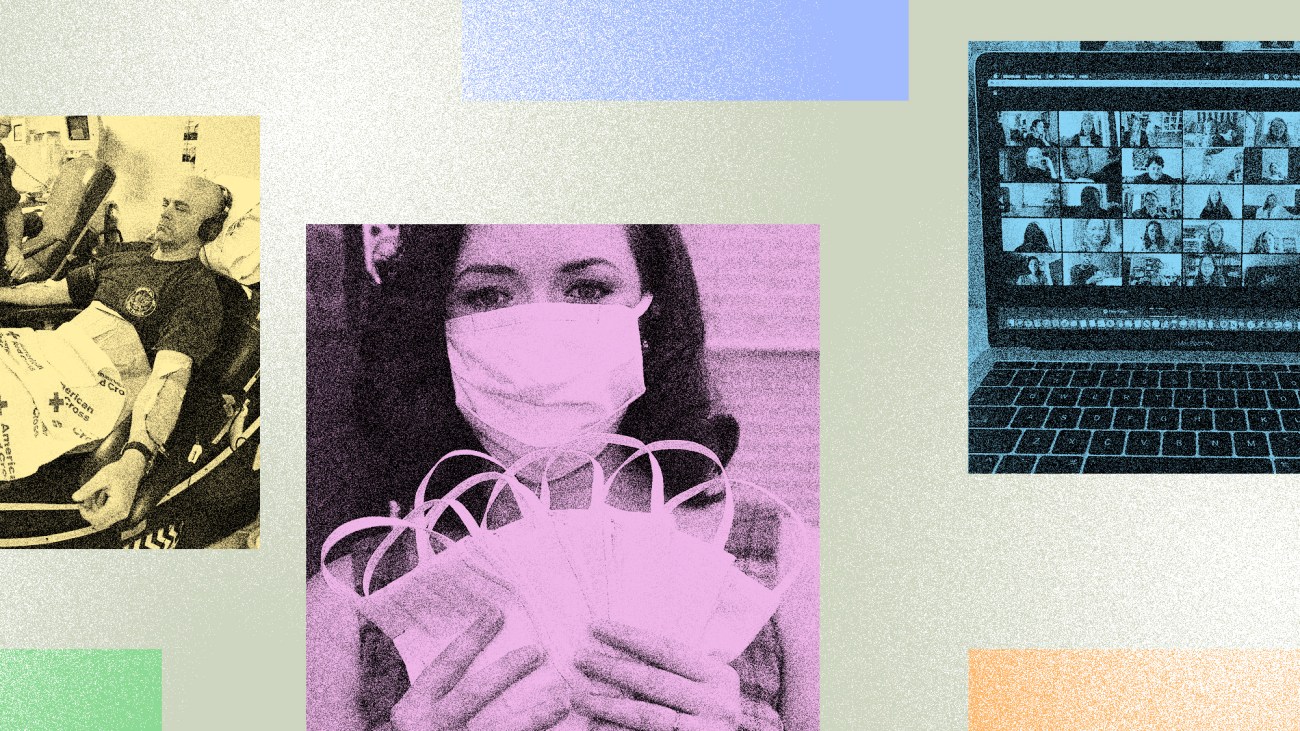

CORONAVIRUS DASHBOARD
THESE post are from Mother Jones. The first is a review of America since the coronavirus Covid 19 pandemic hit us and the opportunity to express your opinions, fears and activities to Mother Jones. The second is a collection of messages sent to Mother Jones of the positive actions people across the country and around the world are doing in response to this pandemic. My favorite is this one " I woke up early yesterday morning to find that my wife, who is terminally ill, was not by my side. I found her in her sewing room, sewing masks.
—Bob in Minnesota " Mother Jones wants these stories from you too. So keep doing the best you can and we will get through this a better nation, a better people. Remember six feet apart is better than six feet under. Remember to start and continue e mailing your local, state and national politicians telling them what you expect them to do about the pandemic and other things ( USA.gov is your online guide to local, state and national politicians, government information and services. ) Remember to check your voter registration status a remember to register to vote. REMEMBER TO VOTE!!!! Remember to keep your family and friends socially distant close, keep your faith and remember 1 Corinthians 13:13 New International Version (NIV) "13 And now these three remain: faith, hope and love. But the greatest of these is love."
Greed Destroyed Our Social Immune System. It’s Time to Rebuild It.

This crisis is about a lot more than a virus.
How are you doing? Suddenly, the platitude feels like a real question. In the video check-in with a loved one, in the shouted small talk with the mail carrier, in the smile to a socially distant stranger’s kids, there is an unspoken connection about our everyday interactions, now that we’re interacting less. No really, how are you doing? It’s the question I want to ask you, our readers, too, because this column is our way of checking in with you, find out what’s going on in your lives, and share how we at Mother Jones are thinking about this crisis.
The change that’s turned our world upside down has not been just about a virus, or an economic crisis. It’s been about altruism vs. selfishness. That, after all, is what our great hunkering down is—a sacrifice to protect vulnerable strangers and the strained health care system we so desperately need right now. To be sure, the toilet paper hoarding, social media whining, and fake health advice–sharing are still out there. But ignorant gonna ignorant, and before long, many of those now acting carelessly will learn better.
The far more dangerous selfishness comes from those whose job it is to be here for others, top among them the man in the White House to whom we should be able to look for guidance but instead get lies. From the insistence that the World Health Organization’s data was “false” and that people could go to work while sick, to the straight-from-chain-email medical advice, and most of all, over and over again, the reminders of the amazing job he was doing. Perhaps the only unassailable truth from the White House has been, “I don’t take responsibility at all.”
But honestly, we already knew this. We knew Trump would make the crisis about himself (and his family’s personal gain). We knew he’d soon look for scapegoats, and find them among people of color and the media. We knew it because that’s what he always does.
What we don’t quite know yet is how much further the president’s allies will follow him into his narcissistic fantasy. Some may find the courage to transcend selfishness. Others are risking Americans’ lives and livelihoods to advance their political agenda. But it’s early days.
What of the rest of us? The lizard brain wants us to hide—or lash out and scream our rage from the rooftops. But rage won’t get us through this. Hiding won’t get us through it. The only thing that can possibly get us through is taking action on behalf of others. Choosing to stay home, to (more painfully) tell our kids they can’t be with their friends, and our aging parents we may not see each other for a while. Forgoing the doctor’s visit we don’t 100 percent need. And finding the political will to do the big, altruistic things we have to do to support the millions who will need help taking care of their families and getting treatment.
Besides, never has altruism been more self-interested than it is now. If we each look out just for ourselves, we’ll all end up suffering more. Our loved ones will be more likely to get sick, our hospitals further overwhelmed, our businesses, paychecks, retirement funds at greater risk from selfishness.
And here is what gives me hope: So much of it is happening. People are sewing masks, giving blood, filling out census forms. They are building mutual aid groups to support neighbors and raise money for restaurant workers. And they are finding new ways to organize politically now that no one will knock on doors or go to meetings in person.
Last week the Mother Jones Podcast asked folks to share their stories of helping others, and you can’t find a better listen than the voicemails that came in response. Grocery store workers talked about showing up to work so the rest of us could get fed, and about giving customers an extra smile. Andrea Gladson, a pilot in Southern California, used Facebook to “brainstorm all the ways we can figure out how to keep our small town alive and connected and not adversarial, because certainly with politics that’s happened a lot in the last couple of years.” And so much more.
How about you, reading this now? How have you been coping? What has you worried? (Sharing with others, including us at MoJo, may lighten the burden.) What are you doing to help others? We’ll share your responses in a future post—it’s another way we can remind ourselves of how connected we all are, despite everything.
Here’s what’s on our journalism minds right now: What does focusing on altruism mean for our work? How can we—as individuals and news organizations—do the right thing for others, and what selfish things should we stop doing?
Some of the obvious steps are, well, obvious. All over the place, news organizations are dropping their paywalls for coverage of the pandemic, allowing readers to access important information whether they can pay or not. (Mother Jones’ website is always free, as are our email newsletters, because readers support our mission of getting important stories out widely.) Journalists are sharing vital health information, explaining how the crisis is affecting every corner of our lives, and showing up where they need to for essential on-the-ground coverage.
But there’s more to be done—and some things that finally need to stop. For starters, we must, must, must stop amplifying misinformation. It’s not a public service to breathlessly aggregate anecdotes or quotes of dubious provenance. And it’s not “objective” journalism to give unfiltered, live airtime to presidential campaign rallies press conferences that literally put the public at risk. As the Washington Post’s indispensable media columnist, Margaret Sullivan, writes:
Trump is doing harm and spreading misinformation while working for his own partisan political benefit…The press — if it defines its purpose as getting truthful, useful, non-harmful information to the public, as opposed to merely juicing its own ratings and profits — must recognize what is happening and adjust accordingly. (And that, granted, is a very big “if.”)
Another way to put it: It’s time to stop, once and for all, the false equivalency that treats truth and lies as mere claims on “both sides” of an argument. When the president, or anyone else in leadership, lies or even unknowingly spreads falsehoods, we need to say so. We need to stop enabling lies from our leaders “because it’s news that they said it” and instead train a relentless spotlight on those seeking to deceive us. And we need to, as media critic Jay Rosen puts it, shift “the focus of our coverage from what President Trump is saying to what his government is doing.
For years now, audiences and experts have been pleading with media organizations to abandon habits that are destructive in a crisis of democracy. But now that we face a health and economic crisis on top of that, there are even more difficult and complex questions we need to confront. Most of all: What should a journalism of altruism look like? Do we need to think about whether our stories are actually helpful—beyond of the “all information is good” default? Is a particular story more likely to leave people informed and perhaps even able to take action, or to make them feel powerless and terrified? What about amplifying factoids and anecdotes that are technically true, but lack context—like the bazillion headlines about the coronavirus on cardboard? The Pomeranian that tested positive for coronavirus? (You can pet your dog, it’s totally fine.) Do we have a duty of care for our audiences, a duty to think about the impact of our work before we publish? And at which point do we need to hand responsibility off to our audiences, lest duty of care turn into disempowerment or paternalism?
These questions are not new. But usually they are debated in the abstract, in think-tank forums and academic journals. Rarely do they take priority in the executive suites of media companies. But Mother Jones, as a reader-supported nonprofit, can do things differently. We can just straight up ask you.
What do you think Mother Jones’ biggest priority in covering the coronavirus should be right now? Where can we have the greatest impact? How can we be more altruistic?
Here’s what our newsroom has been doing so far. Starting in February, when it became clear that this crisis was going to involve a major public health, economic, and perhaps political upheaval, our journalists have published up to a dozen stories each day exploring the impacts—you can find all of MoJo’s coverage here, and also in the new rapid-response blog here. Building a newsroom that could pivot to the biggest story of the moment was a major reason we turned to readers for support these past few years; we couldn’t have guessed it would be like this, but it’s incredible how this support has allowed us to turn on a dime when we needed to. So far, our journalists have been focused on four major categories:
- Profiteering and corruption (including David Corn’s piece on Jared Kushner’s connections to a company that stands to cash in on coronavirus testing)
- Disinformation: For example, fellow Abigail Weinberg debunked the viral hoax that you could drink warm water to protect yourself from the coronavirus. When the chief medical officer at CVS sent that wrong advice to their entire staff, a reader sent us the email, Abigail wrote another story, CNN picked it up, and CVS corrected the email, saving hundreds of thousands of front-line employees from harm. Likewise, data reporter Sinduja Rangarajan looked into the viral spread of misinformation on WhatsApp.
- Exposing the impacts on, and lifting up the voices of, communities—especially those most vulnerable—as they confront new threats and find new ways of organizing. This week’s Mother Jones Podcast—reported in the field just before New York’s shelter-in-place order, and also featuring the voices of Mother Jones listeners—was inspiring.
- And, of course, sounding the alarm (with a level head) on how and why the administration and other powerful institutions and people are responding. Too many examples to pick from, but if you need to blow off some steam with gallows humor, I recommend this weekend’s video of Trump’s actions compared to disaster-movie presidents.
- All while not forgetting about the incredibly high-stakes election we’re in: Kara Voght, for example, looked at the implications for progressives’ ground game, while AJ Vicens focused on election security and concerns that universal vote-by-mail will not be easy to pull off.
Over the past week, so many readers have told us to keep charging hard—on the crisis and everything else that needs to be exposed. You have my promise, we will.
But I have to be upfront with you: It won’t be easy. Already the fallout of the crisis is hitting news organizations hard; even as more people are online looking for information, advertising rates are down. (Facebook, with perfect timing as always, has chosen this moment to make changes that decrease the already low revenue publishers get when you read our stories on their platform.) Everywhere, news sources are laying off staff and reducing pay; many of the nation’s remaining alt-weeklies, the fiercely independent local newsrooms where I got my start, will likely go out of business. Many daily newspapers, squeezed by corporate and hedge-fund owners and crushing debt, will not be far behind. Mother Jones is fortunate in that our support comes primarily from readers like you, but in this economic environment, many people won’t be able to pitch in. If you can, your support will be absolutely vital in keeping our reporting going.
I don’t know how we’ll keep doing what we have to do the next few months. But I know there’s no one I’d rather do it with than the Mother Jones community. As disorienting as these past few weeks have been, they’ve shown that what we do matters. How we react individually and as neighborhoods, cities, and a society matters. Coming out of this together matters. And the things that so many of you are doing are part of the only thing that can defeat this virus, and the challenges yet to come: a social immune system.
That immune system has been much under attack recently—from panic and deception, from greed and profiteering, from political road rage and the “drown it in the bathtub” school of government. We’ll need to build it anew, and build it in such a way that it truly can benefit everyone. You have already begun.
6 APRIL 2020
How the Mother Jones community made me feel better.
Hi. This is my first post for Mother Jones in more than five years working here.
I’m stoked to be doing it, because I remember picking up my first issue of Mother Jones (and the Progressive) at a Barnes & Noble in the Dayton, Ohio, suburbs as a teen, sometime in the late ’90s, and it blew my mind—I wasn’t learning this in social studies.
I’m Brian, and I work on building Mother Jones’ online community. Those fundraising campaigns you see on our site and in our newsletters, those are part of my job. I’m always looking for ways we can listen to and learn from our readers, and I obsess over finding ways to connect with you, because that’s the only way independent journalism is going to survive—with a broad base of engaged, committed readers.
So when the coronavirus pandemic suddenly became real, our first impulse was to take the pulse of the MoJo community. Our CEO, Monika, wrote a column titled “Greed Destroyed Our Social Immune System. It’s Time to Rebuild It,” in which we asked how you’re doing, what has you worried, and how you think Mother Jones can have the greatest impact right now. What you had to say was inspiring, and inspiration is worth sharing, more so now than ever. So that’s what I’m here to do.
We heard from people like Al in Illinois who’s worried about his daughter the nurse, his son delivering food, and his daughter-in-law who works at a grocery store. A reader shared her concern about her husband, who drives a truck from Chicago to California every week, because “there are so many loads right now.” (Let’s hear it for our nation’s truck drivers along with all of the other heroes!). Another reader fears for her husband, who is a field engineer repairing and maintaining the testing equipment used in Virginia hospitals. The first thing I want to acknowledge is the pain and fear that many of you—many of us—share right now. Dan in Sacramento opened his comment by saying, “I’ve not been doing well,” and went on to describe how he’s struggled with a history of social anxiety, which has made sheltering in place even more challenging as he lacks the check-ins with colleagues and friends that sustain his spouse. “I’m only answering this question because I want others to know they aren’t alone in feeling this way.” Thank you for sharing, Dan.
We heard from so many front-line workers, and their families, who are still doing their jobs, and so many who recently lost theirs. We heard from Brian in Tennessee who survived a mass shooting and learned to cope with PTSD, but is feeling trapped once again.
This is real. We see it, we hear it, and we want to be there for you in any way we can. Please keep letting us know what’s on your mind here. Sharing can be a way to cope, and I personally read every single comment.
As I did that, here’s the second remarkable pattern I’ve noticed: So many people sharing their worry about the older and more vulnerable among us—and so many who identified as older or vulnerable talking about how they want to help others. That sense of compassion and caring for others first runs deep through the Mother Jones community.
My colleague Jackie Mogensen, who reports on science, interviewed Dominique Brossard, an expert on risk communications, about how the staggering projections of the pandemic can make us feel helpless. But, Jackie writes:
Hope can empower people. Stories “showing how people are coming together to address the issue of social distancing, how neighbors are helping each other with food, with child care, how people are taking seriously that idea of social distancing,” Brossard says, can give people a sense of self-efficacy and inspire them to take similar action.
A small sample of what your fellow readers have been doing to be there for others:
I woke up early yesterday morning to find that my wife, who is terminally ill, was not by my side. I found her in her sewing room, sewing masks.
—Bob in Minnesota
I am not able to do my volunteer work singing for hospice patients and nursing home residents, so I am working at our local evening sandwich program (aka soup kitchen, with sandwiches, fruits & vegs) two days a week.
—Joanna in Maine
I’ve signed up to be an NHS volunteer (in the UK) and am helping neighbours and elderly friends with grocery shopping. But the widest net I’ve managed to spread has been to create a Facebook group called “The Good in Us” where hundreds of people—from the US to South Africa to Cyprus to Malta to Australia to France to New Zealand to the UK and more—are posting stories of good.
—Gabrielle from the United Kingdom
Every day at 3 p.m. I bring my karaoke machine onto my balcony and sing one song. The song is dedicated to a group or place: Italy, NYC, health care workers, researchers finding a cure/vaccine, our elderly, those who are depressed, friends with compromised immune systems. When I sing, my whole building comes out and sings from their stoop, porch, balcony or the courtyard and pretty soon, we are all dancing. It gives me a sense of fun and peace…It gives us a reason to get dressed, see smiles, have hope.
—Antonia in Los Angeles
I (the quintessential technophobe) have been figuring out how to teach violin and cello lessons online, to keep my students focused and engaged (and giggling!). It helps their parents and helps the kids feel treated as an equal partner in something really cool. If the economy completely tanks and no one can pay me I’ll teach anyway, because I love teaching and because being able to make really beautiful music gives deep joy to everyone involved.
—Louise in New Jersey
Working at a California State University to feed the 100 or so students that cannot go home. Trying to share the limited work hours so that all my cooks have some income. Keeping the Student Food Pantry supplied so students have food available.
—Mimi in California
Yesterday, I was able to gift my Singer sewing machine to a young woman in her thirties. She lamented that she wanted to make masks; now she will be able. More than that, I want to continue to encourage her. She is an immigrant determined to graduate from college. Her community is a few of us from our Friends Meeting who respond to her Facebook posts and offer a bit of input. Mainly, she knows we have her back.
—Carolyn in Portland (We’re not sure: Oregon or Maine?)
We have expanded our food basket program at church to biweekly from monthly and have applied for a grant that would allow us to go weekly. I’m offering math tutoring by FaceTime for students having to do online class.
—An anonymous reader in Kansas
I met a woman a week ago in the grocery section at Target. She is about 70 and pushing a cart with some difficulty. We started talking and she tells me she has a heart condition and has an important doctor appointment at Kaiser in early April. Her daughter planned to fly out from Chicago to be with her, but now cannot come because she’s in the Navy and they’ve grounded her. She was clearly anxious about this. I told her that if she liked I would take her. She lit up and relaxed. We exchanged names and my number. If we do this, she’ll sit in my back seat. The whole encounter was a good moment for both of us.
—Peter in California
I recently became the president of the local historical society. My first act as president was ordering a popular attraction to close. All of our volunteers are seniors and I was not going to endanger their lives. I took some flack but I knew this was the right thing to do.
—Linda in Oklahoma
I work for a domestic violence agency. We are doing our very best every day to continue to provide supportive services remotely. We even have staff meeting clients at our office (at a safe distance) to receive food from our pantry and financial assistance.
—An anonymous reader in Illinois
I have been trained to help people apply for many types of benefits from SNAP to SSI and even Veterans Benefits. I may be unemployed and housebound, but I can still help.
—Robert in Michigan
As a 77-year-old, I’m kinda upset when the governor of Texas and Fox News spout, “Die for the Dow.” But really, if there’s only one respirator for me and a 25-year-old, unless she’s a known psychopath with terminal cancer, she should get it. It’s weird to be expendable!
—An anonymous reader in New Jersey
I like that last one. The profound generosity of offering to give up your own life, delivered with a dash of good-spirited humor. Plus, it gets at the big picture of how this crisis has exposed so many vulnerabilities.
That was the third thing that came through loud and clear from your responses: an overwhelming sense that we as a nation can, and must, do better—and a real concern about the long-term priorities of our leaders.
Sheryl in California and George in Alaska are concerned about how the crisis is going to affect our elections; Lisa in New Mexico wants to flatten the curve for health care and wealth inequality; Paula in California is more concerned about the erosion of rights than she is of the suffering from the illness. And so many readers see the collective action we’re taking as a chance to come out of this as a stronger society—especially as it relates to confronting climate change. Like the reader from Tennessee who wrote:
A big concern for me is still the dystopian future looming for the grandkids. I’ve had a long life, relatively easy by comparison to today, and I am furious that along the way we gave up stewardship of our precious resources, allowed plunder, and laid it all to waste. My generation lived with the possibility of possibility and assumption of a livable future. That’s disappearing.
That blows my mind. I’m 40, and I’ve always thought of my grandparents’ generation as “The Greatest”—the ones who endured or were young in the shadow of the Depression and World War II. And here they are saying they had it “relatively easy by comparison.”
The entire Mother Jones community is pretty damn amazing, too, and I’m in awe of my colleagues who are adapting to working remotely—and caring for others, and even going through COVID-19 themselves—without skipping a beat. Journalism that can debunk misinformation, call out what needs to be called out, and lift up the voices of the most vulnerable is so critical to coming out of this the best we can. Like Monika put it recently, “The only thing that can defeat this virus, and the challenges yet to come, is a social immune system.”
Your actions and journalism like ours are part of it.
Our world has been turned upside down over the course of about three weeks, and so has MoJo’s reporting. Or, then again, it has not: Just as before, our newsroom is digging deep on some of the biggest issues of the moment, from the election to the criminal justice system, the rights of women and people of color, the future of our climate and food systems—only now all these are affected by, and more relevant amid, this crisis. (And every once in a while, a reporter will land on a surprising story that you might not expect—like this essay about dating during isolation.)
But there is one big thing we’re not quite certain about: What the crisis portends for our fundraising prospects.
We had been preparing to launch a big fundraising campaign last week and we’re obviously not doing that in the way we had planned. But we very much need support from readers to keep our journalism going, so if you’re able to pitch in with a donation we’d be beyond grateful, especially as so many people are hit in different ways right now. My partner, who works in the travel industry, was furloughed a few weeks ago, and two of my best friends are looking at shuttering their small businesses that they poured everything into. Nearly 10 million people are estimated to have filed for unemployment benefits in the past few weeks, including many of you who wrote us. How we’re going to support the causes we care about, at a time they’re needed more than ever, is going to be a question for all of us.
Monika and I often say, “Let’s just level with people,” when writing to you about how Mother Jones works, and I saw a draft of her column a few weeks ago that, way at the end, said, “I don’t know how we’ll keep doing what we have to do for the next few months.” Strong words—but true.
We’ll have a clearer picture of what all of this means for our finances, and thus our journalism, before too long, and I’m sure Monika will have more to say about that as we do. But for now, we know we have to keep our shoulder to the wheel, we know you need us to keep doing the kind of journalism the moment demands, and we know we have to pay for it every single day. It would be amazing if even just a handful of our readers who are able to support our work did so today while we figure out where we go from here.
It’s impossible to predict the future. Here in the Bay Area, we’re sheltering in place until at least May 3. I’ve heard our surge is supposed to come sometime in late April. With so much uncertainty, the best we can do is take it one day, one week, one very long month at a time.
But we also can’t predict the future because it is not preordained: The daily decisions we make are how we create it. Want to listen to scientists instead of politicians? We can. Want to make sure this newfound cohort of essential personnel—educators, truck drivers, grocery store and restaurant workers, facilities engineers and janitors, health care workers of all stripes, and so many more—are appreciated, and paid, more? We can. Want to build a stronger social safety net and continue providing mutual aid in our neighborhoods and towns? We can do that too.
It’s been a tough month for me, but after processing everything we heard from you and writing it out I feel a lot better. Together, we are going to get through this the best we can and I know that with enough grit, we will come out stronger—because I see you, and our team at Mother Jones, rising to the challenge every day.
You all inspire me to show up. Thank you.
RELATED
WE RECOMMEND


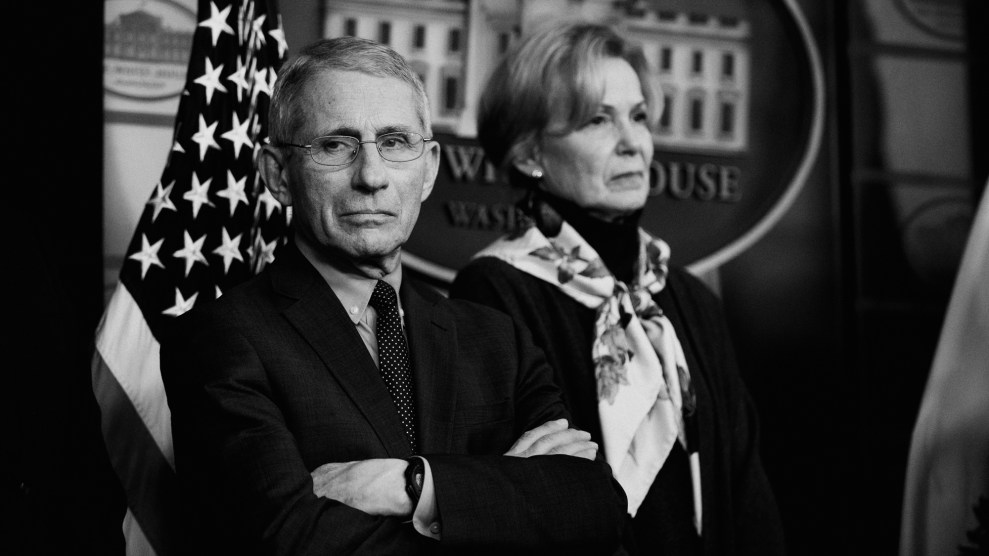

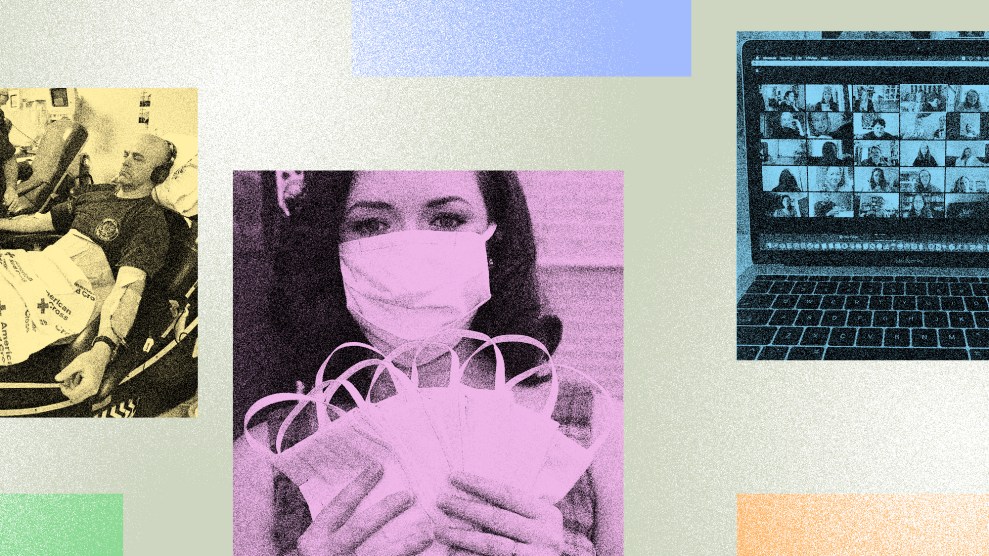
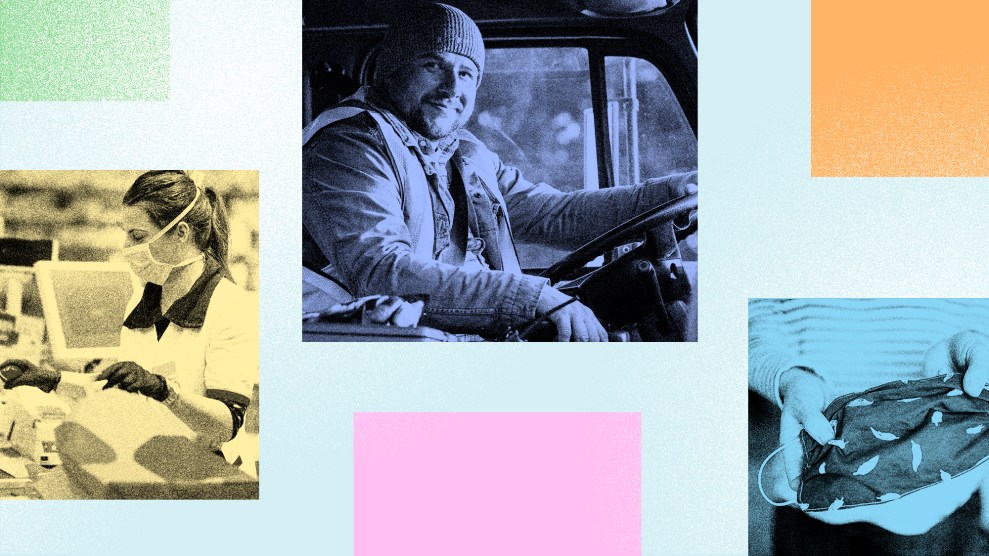

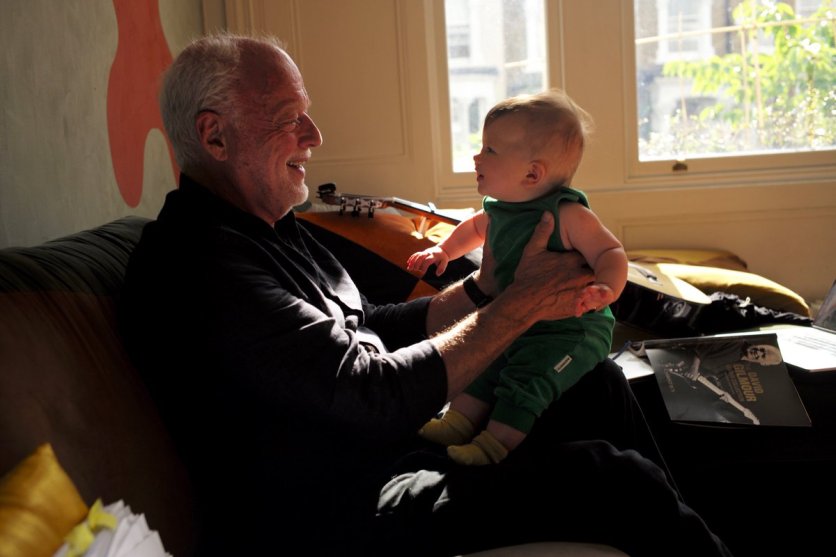
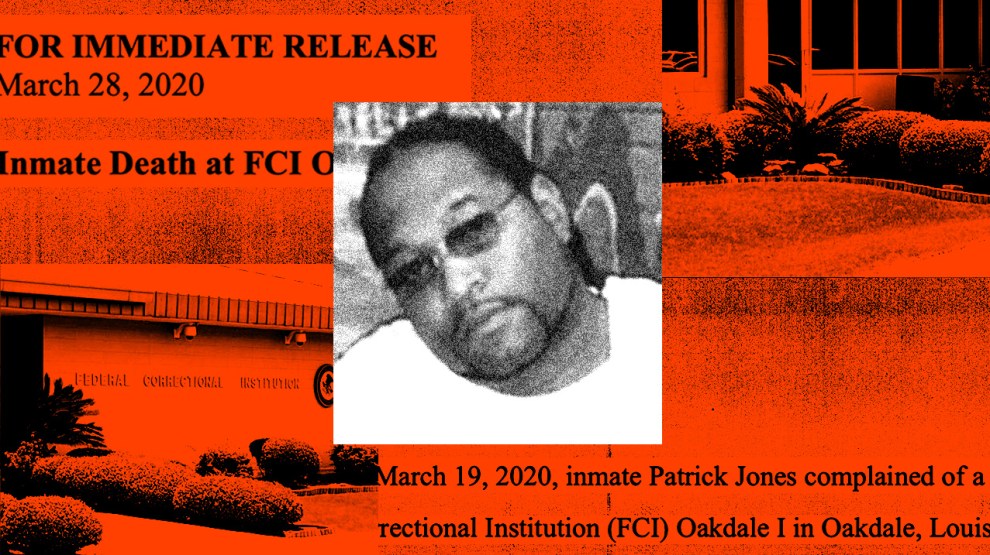
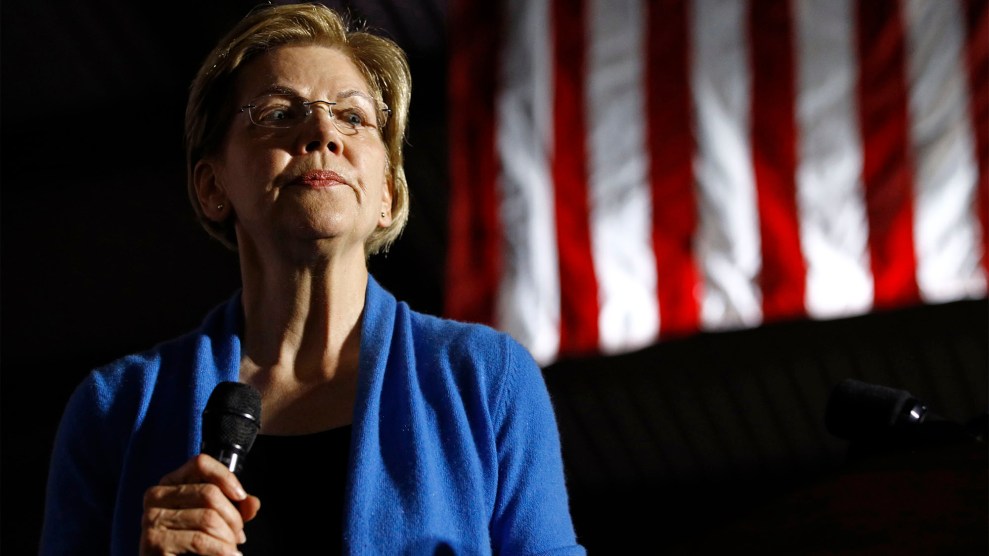

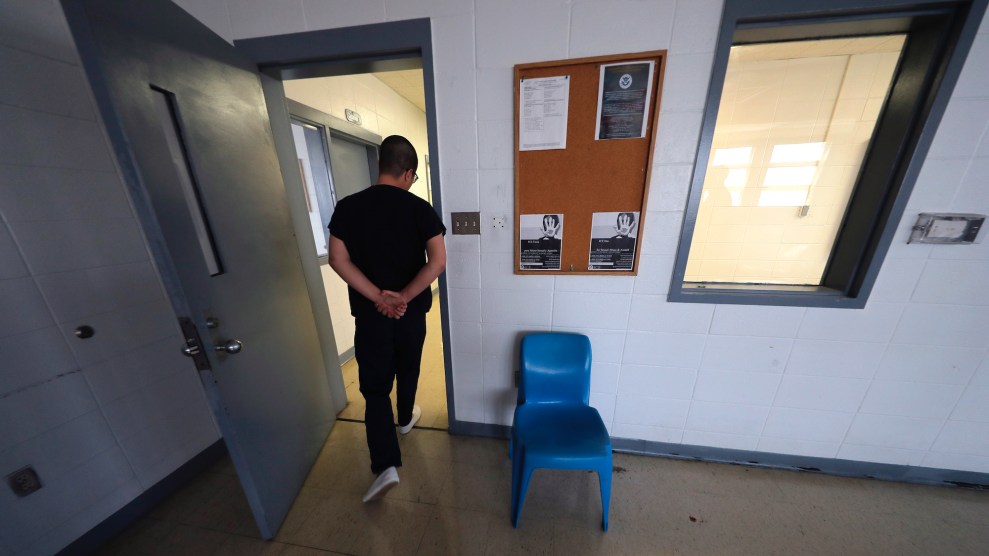
No comments:
Post a Comment